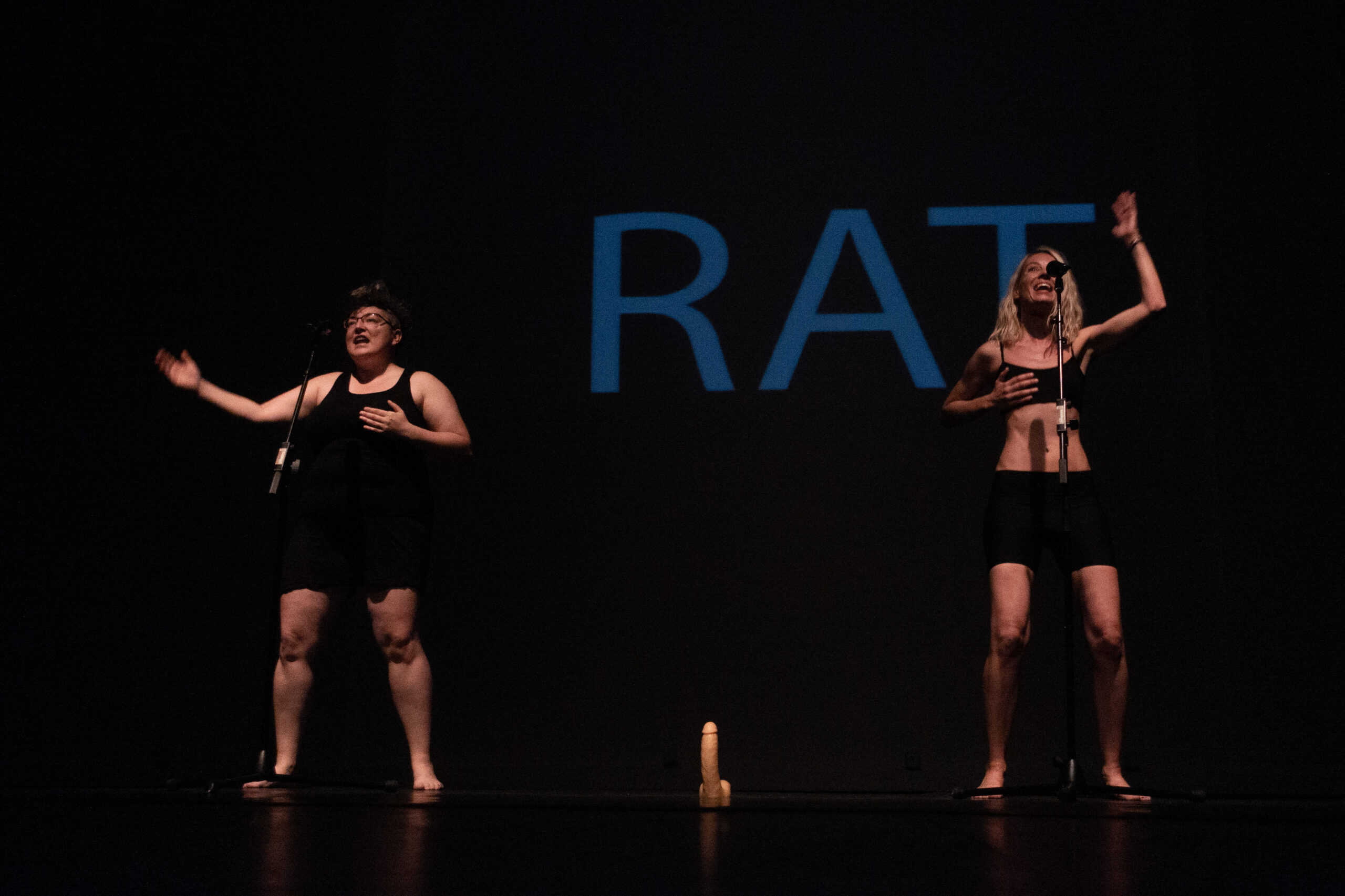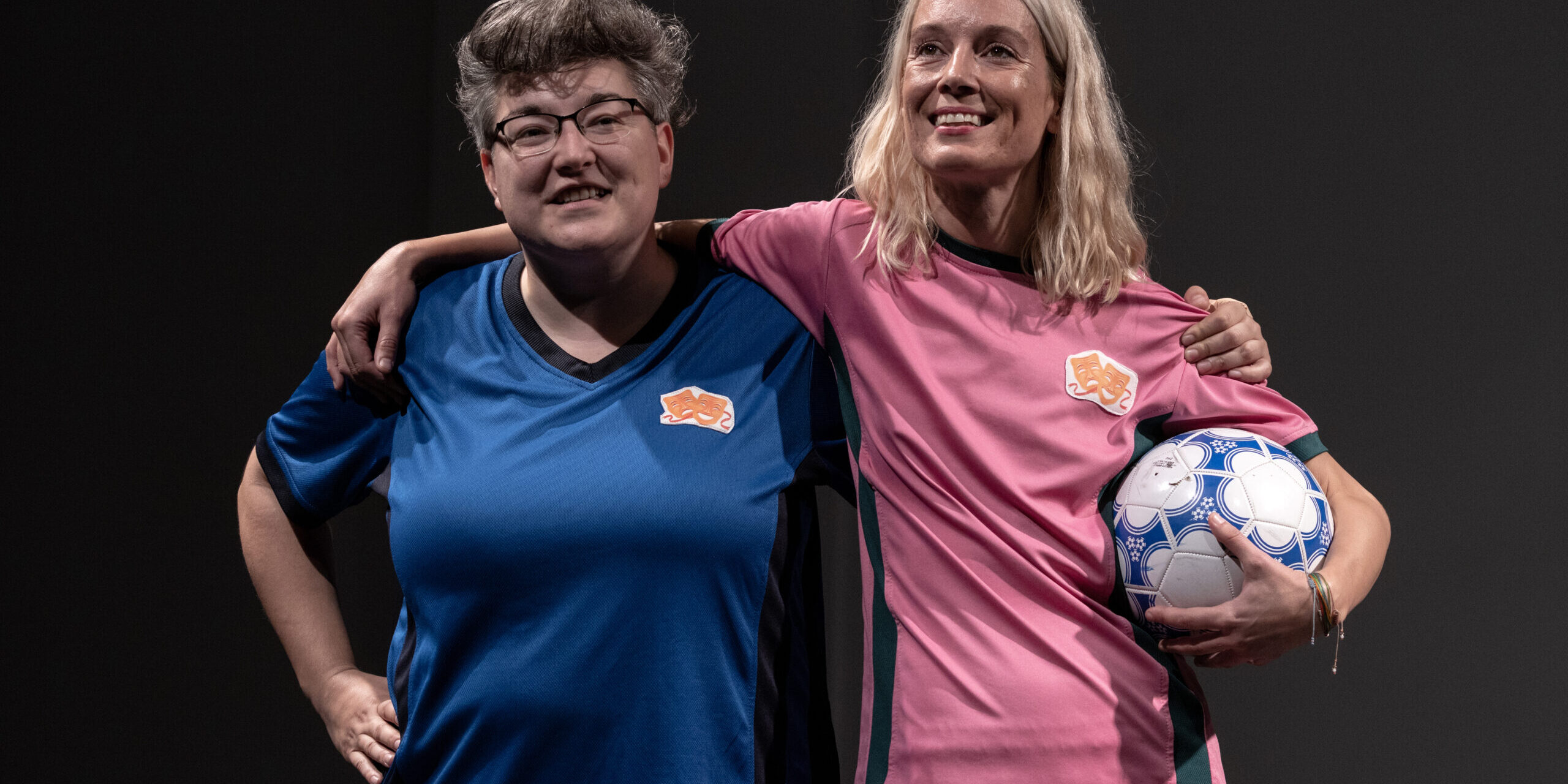Centre for Cultural Decontamination, Belgrade, premiere 27th September 2022
It is no big revelation that women are treated unequally compared to their male colleagues on the Serbian theatre scene. But the reality of this, when presented in blunt facts and figures, still stings.
Maja Pelević and Olga Dimitrijević, the authors and performers of World without Women, start the show with a presentation of their research into the position of women in Serbian theatre. They analysed the repertoire of Belgrade’s institutional theatres and compared the number of male and female playwrights and directors who worked there from 2009 to the present. At the National Theatre, for example, there were 61 shows based on plays written by men and only 9 based on women’s writing. At the Yugoslav Drama Theatre, the ratio was 45 to 9. But if these statistics look too bleak to you, they are nothing compared to the Zvezdara Theatre, where the ratio for men and women respectably was 23 to 1, both for playwrighting and directing.
Pelević and Dimitrijević don’t particularly obsess about these results, however, they use humour as a defence mechanism. “Just like the Hilandar monastery, a woman never set foot in Zvezdara Theatre”, they proclaim to the audience.
This first part of World without Women properly captures the tone and artistic approach of the whole show. Pelević and Dimitrijević deal with serious topics about the position of women in theatre – job instability, insufficient pay, little to no free time, harassment from some male colleagues and the prevailing idea that artists should sacrifice their lives for art.
But despite the weight these issues carry with them – or precisely because of that – Pelević and Dimitrijević present these problems with a layer of irony so thick, that the show is frequently hilarious. World without Women is full of scenes that parody the precarious lives of independent artists and this humor does not ridicule their positions but is a necessary component without which the reality would seem too stark and even unbearable.

Olga Dimitrijević and Maja Pelević in World Without Women. Photo: Jelena Janković
The whole show is structured in a pseudo-documentary style and individual scenes usually start with a particular social problem that the artistic duo transforms into comic relief. For example, the law in Serbia grants every person who donates blood two days off work. But whom does an independent artist ask for this “privilege”? Dimitrijević wanted to find out that during the creative process of the show. She allegedly donated blood and took the medical confirmation (which is also presented to the audience) to Pelević only for her to erupt in disappointment and accuse Dimitrijević of sabotaging the rehearsal process with her exhibitionism.
It could be said that Dimitrijević is playing the “good cop” and Pelević the “bad cop” in a performance that, essentially, points out that both of them have no power to truly act. Dimitrijević is the one who tries to stand up for her rights, while Pelević is pretending to be a benevolent dictator who adheres to the high artistic standards and expects the same from her co-star.
When at the end of the performance Dimitrijević wants to go on strike because of bad working conditions, Pelević asks if she’s just going to go home and let everyone forget about her existence because that’s the only thing an independent artist on a strike can do. One more thread of irony throughout the show that both artists repeatedly point out is that they are creating a show about precarious working conditions for female artists and the co-producer BITEF still hasn’t paid them for their work.
On a performative and scenic level, the show abounds with various parodic images of how society sees women and female artists. The two artist-performers enter the stage dressed in football jerseys as an act of defiance to the German theatre director Frank Castorf who said that both women’s football and theatre are no match to the work of their male colleagues.
Later in the show, Pelević and Dimitrijević fight, wrestle and undress, while Pelević even enacts a short physical performance with a dildo. The authors present themselves on stage as male society wishes to see them, but they reinforce those images to absurd and extreme dimensions that become unsettling and subversive.
But besides all the humor, playfulness and provocative imagery, World without Women is a show limited by the constraints it thematizes. The authors not only repeatedly admitted that neither they nor the theatre have the power to elicit change, but they refuse to imagen a scenario where that would be possible. The announcement of the show on BITEF’s website says: “If we are unable to overcome the power relations and come up with some new models in theatre, in which we create different and new worlds, how could we expect to do it in the real world?” Thus, it’s even more puzzling that the show’s function is precisely the opposite – to analyse and critique the current position of women in theatre and offer no alternatives.
Then again, imagining alternatives is something that not only this show but the whole theatre scene has a problem with and criticizing the current state of being is an important role. World without Women does this in an insightful and witty manner.
Credits:
Concept, text, performance: Olga Dimitrijević and Maja Pelević
Choreography and stage movement: Igor Koruga
Music: Anja Đorđević, Vladislav Rac
Video: Deana Petrović
Costume: Selena Orb
Light design: Nikola Zavišić
Texts used in the performance by: Silvia Federici, Angela Dimitrakaki, Valeria Graziano, Katja Praznik, Danielle Child, Helena Reckitt, and Jenny Richards
Producers: Bitef Theatre and Centre for Cultural Decontamination, Belgrade, Serbia
Further reading: review of Crises (BITEF 2022)
Further reading: review of Gardien Party/Tijuana (BITEF 22)
Further reading: review of (Not) the End of the World (BITEF 22)
Borisav Matić is a critic and dramaturg from Serbia. He is the Regional Managing Editor at The Theatre Times. He regularly writes about theatre for a range of publications and media.
He’s a member of the feminist collective Rebel Readers with whom he co-edits Bookvica, their platform for literary criticism, and produces literary shows and podcasts. He occasionally works as a dramaturg or a scriptwriter for theatre, TV, radio and other media. He's the administrator of IDEA - the International Drama/Theatre and Education Association.








